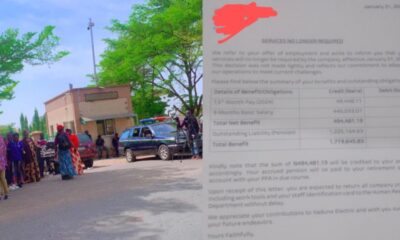Inside Nigeria
Fuel price hits N1,100/litre in Kaduna amidst scarcity

The scarcity of Premium Motor Spirit, petrol in Kaduna has dramatically soared, with pump prices hitting as high as 1,100 per litre.
According to information obtained by our correspondent, the Nigerian National Petroleum Company Limited (NNPCL) has been told to promptly resolve the supply bottlenecks by the citizens of the state, who are unhappy about the current state of things.
This is as a fresh product scarcity hit Lagos, Abuja and other states of the federation over the weekend, with ex-depot prices rising as high as ₦700 per litre, and pump prices as high as ₦900 per litre as of Monday.
The chief corporate communications officer of the NNPC Ltd, Olufemi Soneye, in a statement on Monday, explained that the adverse weather condition affected berthing at jetties, truck load-outs and transportation of products to filling stations, disrupting station supply logistics.
“The NNPC Ltd wishes to state that the fuel queues seen in the FCT and some parts of the country were a result of disruption of ship-to-ship (STS) transfer of Premium Motor Spirit (PMS), also known as petrol, between Mother Vessels and Daughter Vessels resulting from a recent thunderstorm.
“The adverse weather condition has also affected berthing at jetties, truck load-outs and transportation of products to filling stations, causing a disruption in station supply logistics,” Mr Soneye said.
He further explained that due to the flammability of petroleum products and in compliance with the Nigerian Meteorological Agency (NIMET) regulations, it was impossible to load petrol during rainstorms and lightning.
“Adherence to these regulations is mandatory as any deviation could pose a severe danger to the trucks, filling stations and human lives.”
Similarly, he said the development was compounded by consequential flooding of truck routes, which has constrained the movement of PMS from the coastal corridors to the Federal Capital, Abuja.
According to him, the NNPC Ltd was working with relevant stakeholders to resolve the logistics challenges and restore a seamless supply of petrol to affected areas.
“Already, loading has commenced in areas where these challenges have subsided, and we are hoping the situation will continue to improve in the coming days and full normalcy will be restored,” he added.
The NNPC also called on motorists to avoid panic buying and hoarding petroleum products, adding that its retail outlets will now operate for longer hours, to alleviate the fuel queues experienced in Lagos, Abuja, and other major cities across the country. The development would culmulate in an extension of the turnaround period for petrol trucking, according to NNPCL’s Executive Vice President of Downstream, Dapo Segun.
Earlier, Minister of State for Petroleum Resources (Oil), Lokpobiri Heineken, expressed understanding of the public’s frustration.
He said, “I understand the frustration many of you are feeling due to the fuel queues in cities such as Abuja. Recent flooding on the trucking route and unavoidable logistical challenges due to weather concerns have temporarily disrupted our distribution chain.
The minister assured that a dedicated team is working round the clock to resolve these issues, restating the government’s commitment to restoring normal fuel supply as quickly as possible.
The Executive Director of Distribution Systems, Storage, and Retailing Infrastructure at the Nigerian Midstream and Downstream Petroleum Regulatory Authority, Ogbugo Ukoha, added that the tightness in Abuja and parts of Lagos was caused by inclement weather impacting offshore operations and trucking routes.
He assured that efforts are underway to prevent hoarding and black-market activities, “Our officials are on the ground at stations and depots to ensure there is no hoarding.
“We urge Nigerians to purchase the volume they need without panic.”
Ukoha also clarified that there are no plans to increase the fuel pump price, “There is no intention or any anticipated plan to increase pump price. Our two organisations will continue to collaborate to ensure energy security.”
































